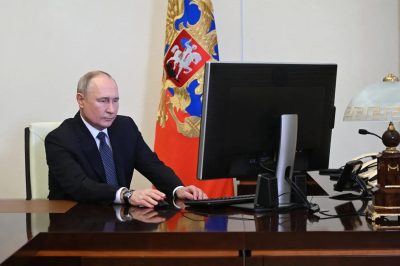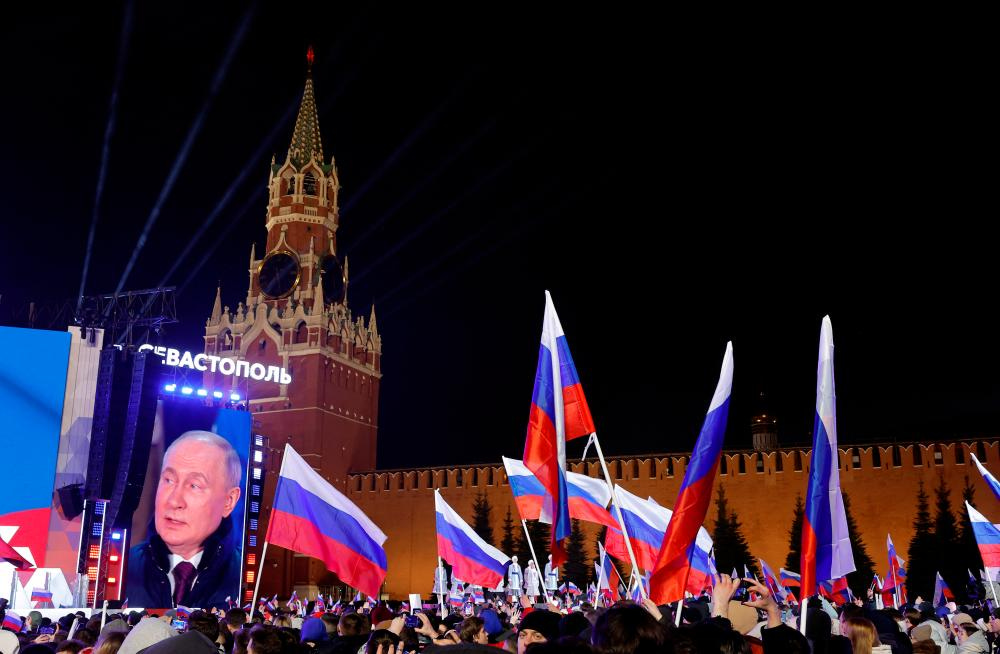Democracy, Russian Style. Scott Ritter

All Global Research articles can be read in 51 languages by activating the Translate Website button below the author’s name (only available in desktop version).
To receive Global Research’s Daily Newsletter (selected articles), click here.
Click the share button above to email/forward this article to your friends and colleagues. Follow us on Instagram and Twitter and subscribe to our Telegram Channel. Feel free to repost and share widely Global Research articles.
Global Research Fundraising: Stop the Pentagon’s Ides of March
***
Russia just wrapped up three days of electoral processes which will define the internal direction of that nation for the next six years and, in doing so, serve as the driving force of global transformation for decades to come. Russia has some 112.3 million registered voters. From March 15 through March 17, a little more than 77% of them came out and cast their vote for who would be their president for the next six years. An overwhelming percentage—over 88%—cast their vote for the incumbent, Vladimir Putin.
Let there be no doubt—there was no question as to what the outcome would be in this election: Vladimir Putin was always going to win reelection.
Let there also be no doubt—the 2024 presidential election in Russia is the most important political event of the post-Cold War era, the byproduct of one of the greatest expressions of democratic will that the world will see in modern times.
The election was far more than a vote of confidence in an individual—Vladimir Putin has been the dominant political force in Russia since the turn of the century, a man who has, through sheer force of will, led Russia out of the dark catastrophe of the 1990’s, positioning Russia as one of the most powerful and influential nations of the modern era.
The election was not a mandate on the war in Ukraine—that issue had been decided in the fall of 2022, when Russia was compelled to mobilize its manpower and military industrial capacity as what had been envisioned as a short military campaign against Ukraine transformed into a larger, longer military struggle against the collective West.
Simply put, the Ukraine conflict was not on the ballot in 2024.
What was on the ballot was the future of Russia.
Vladimir Putin is 71 years old. His victory secures him another six-year term in office. When this term ends, in 2030, Putin will be 77 years old.
Russians are students of history, and they know too well the sad legacy of the period of Soviet stagnation, which began in the mid-1960’s under the leadership of Leonid Brezhnev. Brezhnev was 75 years old when he died in office, a mentally and physically feeble man. He was replaced by Yuri Andropov, who died two years later at the age of 69, only to be replaced by Konstantin Chernenko, who died in 1985 at the age of 73.
There is no reason to believe that Vladimir Putin will not maintain his current level of physical health and mental acuity for the remainder of his new term in office. But all men are, in the end, created equal, and the ravages of time weigh heavily on everyone, even someone as exceptional as Vladimir Putin.
For the past quarter of a century, Vladimir Putin has relied upon a core team of advisors and officials to help him lead Russia on its path of recovery. While this team has proven to be very capable, it, too, is subject to the same laws of nature that govern human existence as everyone else—ashes to ashes, dust to dust.
No man can live forever.
Russia, however, is in the minds of the people who constitute the Russian nation, eternal.
Having saved Russia from the deprivations of the 1990’s, when the collective West, led by the United States, conspired to keep Russia down by tearing it apart, Vladimir Putin is cognizant of the lessons of history which saw what happens when a ruling elite holds on to power for too long without any thought as to who will take their place.
Mikhail Gorbachev tried to lead Russia (the Soviet Union) out of the period of Soviet stagnation. He did so in a reactive fashion, without a well-thought-out plan, and the result was the collapse of the Soviet Union and the horrible decade of the 1990’s.
If Vladimir Putin were to approach the next six years as merely a continuation of his impressive tenure in office, he would be leading Russia down a path where it would collide with the harsh mistress that is historical precedent—an aging man, at the head of an aging system of government, with no clear plan on how to proceed when the inevitable appointment with destiny arrives.
In short, should the situation arise where Vladimir Putin feels compelled to seek an additional six-year term as Russia’s president in 2030, then Russia would more than likely find itself in danger of sinking into a new period of stagnation where the gains that have been made over the course of three decades of Putin rule will be squandered, and the potential of a societal collapse on par with the 1990’s a distinct reality.
This is why the important statistic to emerge from the 2024 Russian presidential election is not the 88% of the voters who marked their ballots in support of Vladimir Putin, but instead the 77% of the eligible voters who came out to express their support for the Russian state. Voter participation levels have always been seen as a reflection of the confidence a particular electorate had that the system of government they were sustaining through their vote best reflected the vision they themselves had of the nation they lived in.
By way of comparison, the 2020 presidential election in the United States saw a record-level 66% participation rate by eligible voters.
The 2024 presidential election in Russia beat that mark by 11 percentage points.
This means that the Russian people are confident that the 71-year-old Vladimir Putin will not be leading them down a path of historical inevitability where they are destined to repeat the mistakes of the past. Rather, the Russian people, confident in where Vladimir Putin has taken them to date, believe that he is the man who will best position Russia to be able to sustain these gains, and continue to prosper, in an eventual post-Putin Russia.
The 2024 Russian presidential election was a not a vote to maintain the status quo.
It was a vote for change.
The man that will oversee this change is Vladimir Putin.

Post-election rally in Red Square following Vladimir Putin’s victory in the 2024 presidential election
In the coming months, one can expect to see the beginning of a changing of the guard. The Russian leaders who helped Putin get Russia to where it is today will be set aside, to be replaced by a younger generation of Russian leaders who will, under the guidance and leadership of Vladmir Putin, prepare Russia for whatever challenges that await it once Vladimir Putin is no longer president.
How this change will manifest itself—perhaps a transition from a Moscow-centric political elite to one derived from the various regions of Russia—is as yet unknown. But there will be change, because there must be change.
And this change was on the ballot.
The West derided the 2024 Russian presidential election as a sham.
Nothing could be further from the truth.
The 2024 Russian presidential election was the manifestation of a thriving democracy, but a democracy defined by Russians.
The West focuses on the 88% of the Russians who voted for Vladimir Putin and derides the result as little more than a foregone conclusion in a system that offered the people only one real choice.
Russian democracy, however, is defined by the 77% level of electoral participation, and reflects the confidence of the people in the Russian state’s ability to take them from the strong position that Vladimir Putin has brought them and sustain this strength in a post-Putin era.
It was not a vote defined by recertifying the past, but rather a vote which empowered the government to undertake the critical changes needed for the future of the Russian nation.
It was the perfect expression of democracy, Russian style.
*
Note to readers: Please click the share button above. Follow us on Instagram and Twitter and subscribe to our Telegram Channel. Feel free to repost and share widely Global Research articles.
All images in this article are from the author

